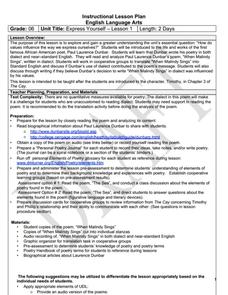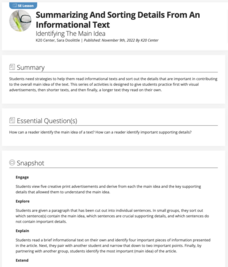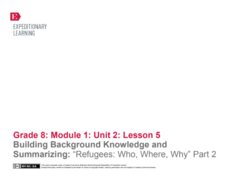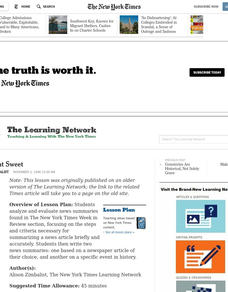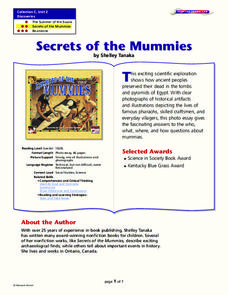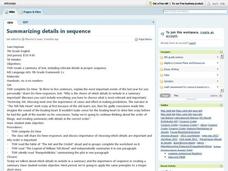E Reading Worksheets
Summarizing Text
Help learners find the most important information in a text with a lesson on summarizing. As kids read through a passage about Johannes Gutenberg, they summarize small excerpts, put events in sequential order, and respond to two longer...
EngageNY
Analyzing Text Structure & Summarizing Text: “Equal Rights for Women” by Shirley Chisholm
Let me check my schedule! Scholars set up discussion appointments with five classmates to discuss Shirley Chisholm's speech "Equal Rights for Women." Readers then use their Note Catcher guides to analyze the text of the speech more...
Curriculum Corner
Informational Text Graphic Organizers
Scholars delve into an informational text with the help of four pages that focus on the author's purpose, vocabulary words, summarization, and main idea.
Curated OER
Paraphrasing and Summarizing
Read an article about the migration of our ancestors and write a paragraph. Pupils paraphrase and summarize to restate the information found in a nonfiction text. They write a shortened version of the reading to demonstrate the...
Curated OER
Persuasive Arguments
Examine persuasive writing using this informational excerpt about natural habitat conservation. Readers examine the headings of three paragraphs to determine their effect, then copy the first sentences of each. They use these topic...
Baruch College Writing Center
Summarizing, Paraphrasing, and Quoting Workshop
What's the difference between summarizing and paraphrasing? Show class members how to find the main ideas from informational text and condense it, restate it, or quote it directly with a series of educational activities based on two...
cordovla.weebly.com
Summarizing, Paraphrasing and Quoting
How skilled are your class members at summarizing, paraphrasing, and quoting from a text? Find out with this assessment that asks readers to identify the thesis statement, the summary, the paraphrases, and the quoted material in an...
K12 Reader
Summarize It: President Theodore Roosevelt's 7th Annual Message to Congress
How did Theodore Roosevelt stress the importance of conservation during his time as president of the United States? Take a closer look at the language Roosevelt used himself in a 1907 address to Congress, and have your young historians...
EngageNY
Mid-Unit 3 Assessments, Part 2: Summarizing, Analyzing and Discussing Research
Why is reading important? As part of the mid-unit assessment, scholars read, summarize, and analyze an article about the importance of reading. Additionally, they continue their discussion about whether their rules to live by should be a...
Student Achievement Partners
"The Glorious Whitewasher" from The Adventures of Tom Sawyer by Mark Twain with Mini-Assessment
It's the classic scene: Tom Sawyer is whitewashing a fence. Expose your learners to Mark Twain's humor while reinforcing reading comprehension. Eighth graders are encouraged to read and reread, achieving as much exposure to the text as...
Ontario
Reading Informational Text
Learning to recognize the importance of the features of information text (i.e., titles, subtitles, endnotes, sidebars, etc.) is the focus of a reading activity designed for middle schoolers. Learners examine how these text features help...
Curated OER
Whittle, Whittle it Down: Summarizing
Middle schoolers summarize a one to two page article of informational text. They compose a summary according to the guidelines on the "Five Rules for Writing a Summary" chart. They take turns reading their summary to the group, and...
Curated OER
Main Idea in Informational Text
Individuals complete a pre-assessment to gauge their ability to determine the main idea and supporting details in nonfiction text. They examine a new piece of nonfiction reading by looking at the table of contents, headings, and index...
Curated OER
6th Grade: Express Yourself, Lesson 1: Poem
While originally created to accompany The Cay, this poetry lesson could be used on it's own, especially if you are working on dialect. Class members conduct a close reading of "When Malindy Sings" by Paul Laurence Dunbar and listen to an...
Polk Bros Foundation
Comprehensive Nonfiction Reading Questions
Analyze any nonfiction text with the set of questions on this sheet. Class members practice inferring by noting the main idea and purpose of a passage. They also analyze an opinion in the passage and write a brief summary. See the...
K20 LEARN
Summarizing and Sorting Details from an Informational Text: Identifying the Main Idea
Scholars participate in two activities that teach them to identify the main idea and key supporting details in informational text. Partners create a visual that reflects the main idea and key supporting details in an informational text...
E Reading Worksheets
Summarization and Narrative Sequence
Readers are asked to identify seven important events in a narrative and then to explain why these events are key to the story. To conclude the activity, kids craft a summary using their list.
EngageNY
Building Background Knowledge and Summarizing: “Refugees: Who, Where, Why” Part 2
What are some universal aspects of refugees' experiences worldwide and throughout history? Scholars read the text "Refugees: Who, Where, Why" and create two class anchor charts. Finally, they each write a paragraph that provides an...
EngageNY
Mid-Unit Assessment: Analyzing an Author’s Argument and Text Structure
William Shakespeare: a writer, a poet, a fake? For their mid-unit assessments, scholars read an excerpt from the article "The Top Ten Reasons Shakespeare Did Not Write Shakespeare" by Keir Cutler. Next, they analyze the author's argument...
Curated OER
Short and Sweet Science
Readers learn how to summarize scientific text and evaluate the advantages, disadvantages, and challenges in writing summaries. They select science-related articles you've pulled and collected from the New York Times and, with a partner,...
Curated OER
Short But Sweet
After analyzing and evaluating news summaries found in the New York Times "Week in Review" section, middle schoolers study the steps for summarizing a news article briefly and accurately. They write two news summaries: one on a newspaper...
Curated OER
Secrets of the Mummies
How did the ancient people of Egypt preserve their dead so well that their bodies are still recognizable today? Learn the painstakingly complex process they used for preservation. Young scholars read and summarize a narrative detailing...
Curated OER
Summarizing Details in Sequence
Seventh graders write a few sentences explaining the most important events of their lives during the past year. As a class, they discuss why they chose the elements they did for their sentences. To end the lesson, they read a variety of...
National Math + Science Initative
Reading an Informational Text: "It All Started with Sputnik"
Sputnik was one of the greatest scientific advancements of the 1950s, and this reading lesson does it justice. Pupils start off with pre-reading questions and a video. They then read an excerpt from an article, which is accompanied by...
Other popular searches
- Summarizing Text Worksheets
- Free Summarizing Text
- Summarizing Text 3rd Grade
- Summarizing Text 2nd Grade
- Summarizing Text Samples
- Summarizing Text 7th Grade
- Summarizing Text Activities
- Summarizing Text Sheets
- Summarizing Text Content
- Summarizing Text Key Points
- Summarizing and Text Structure
- Text Comprehension Summarizing















